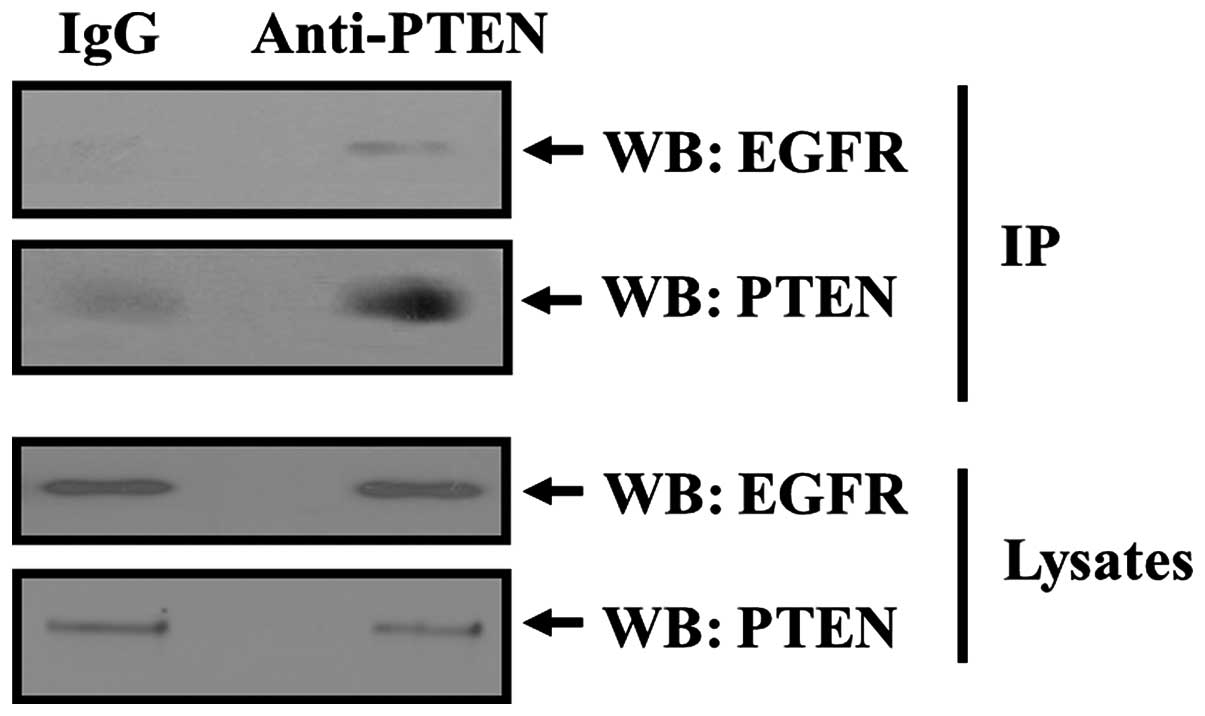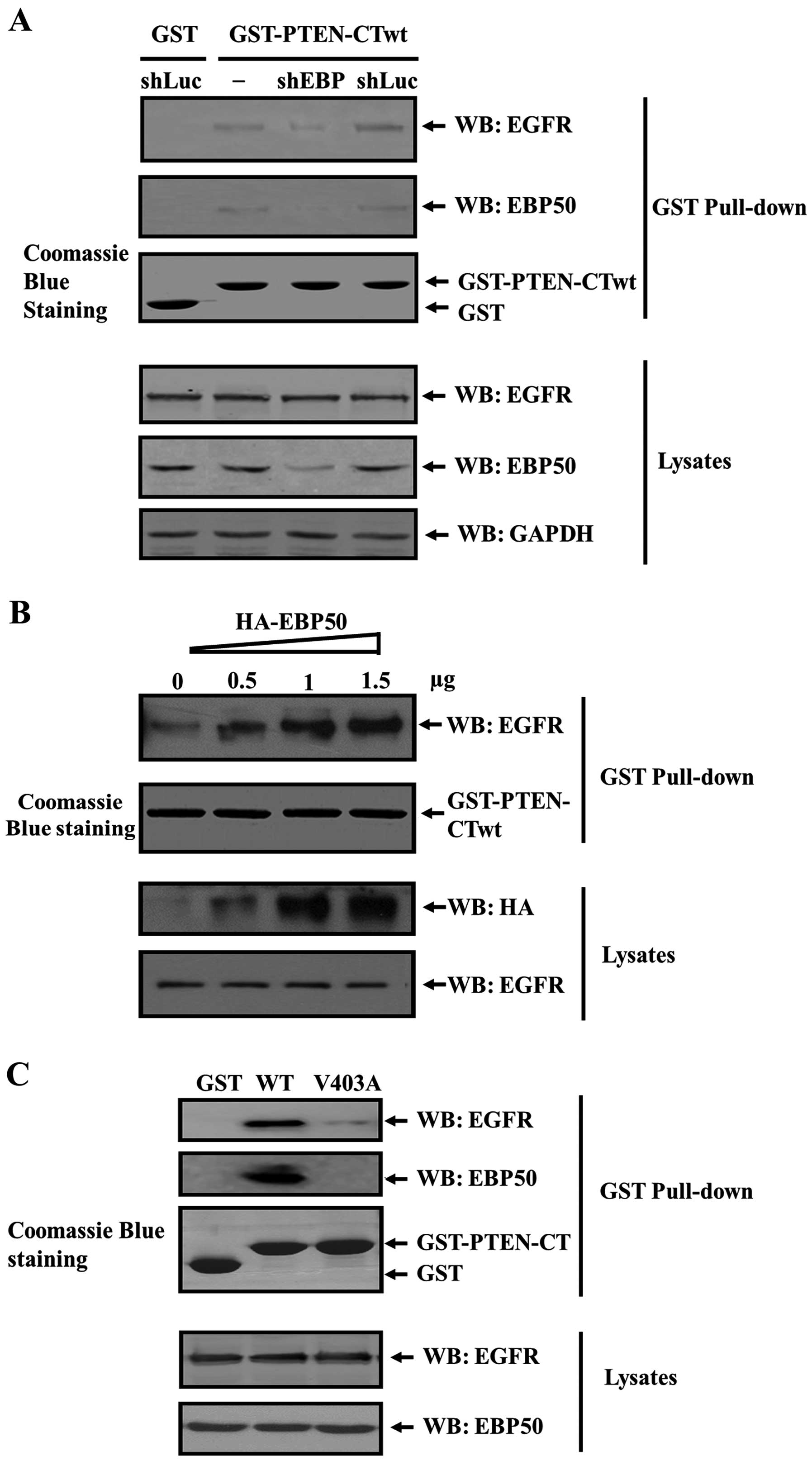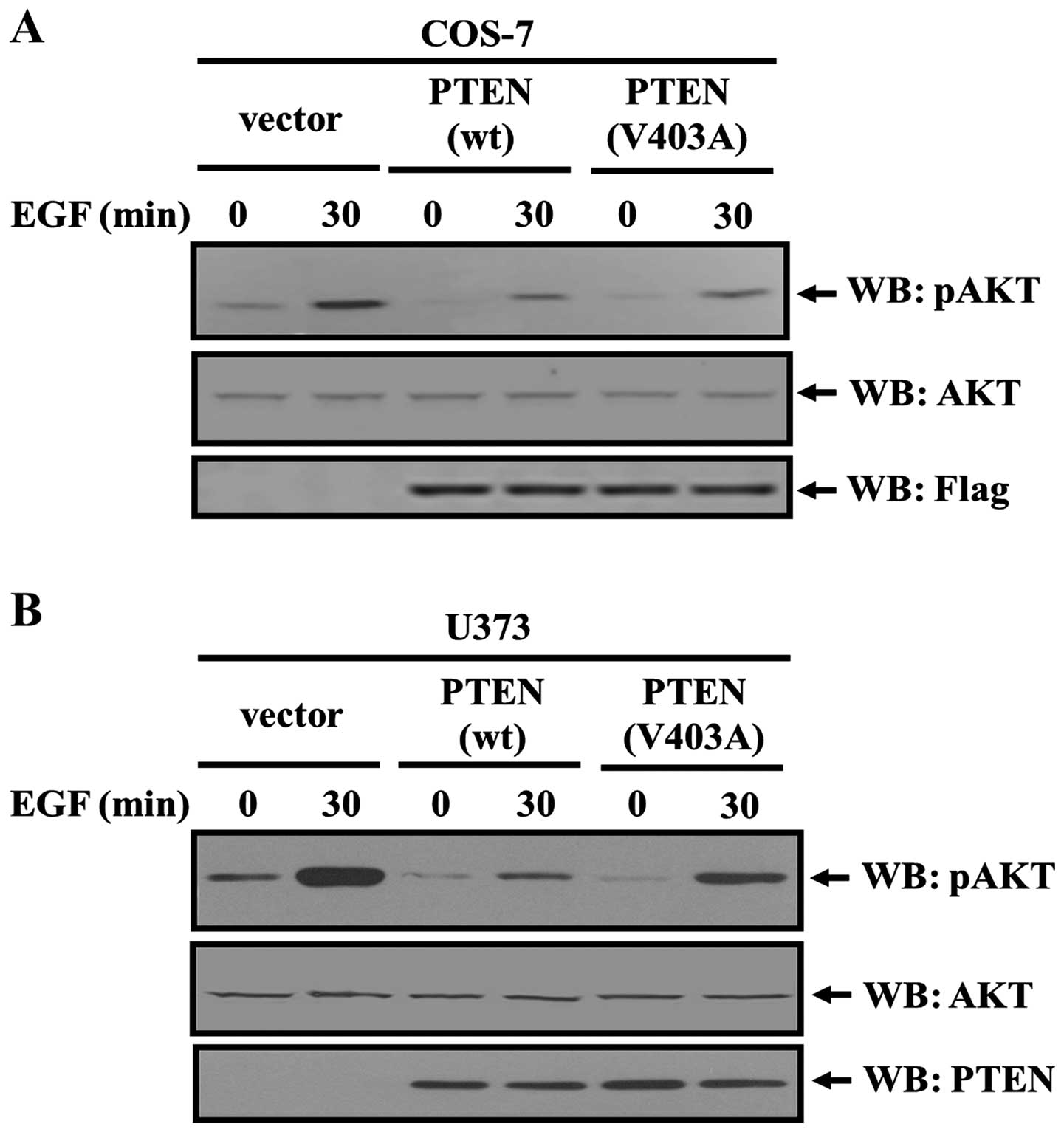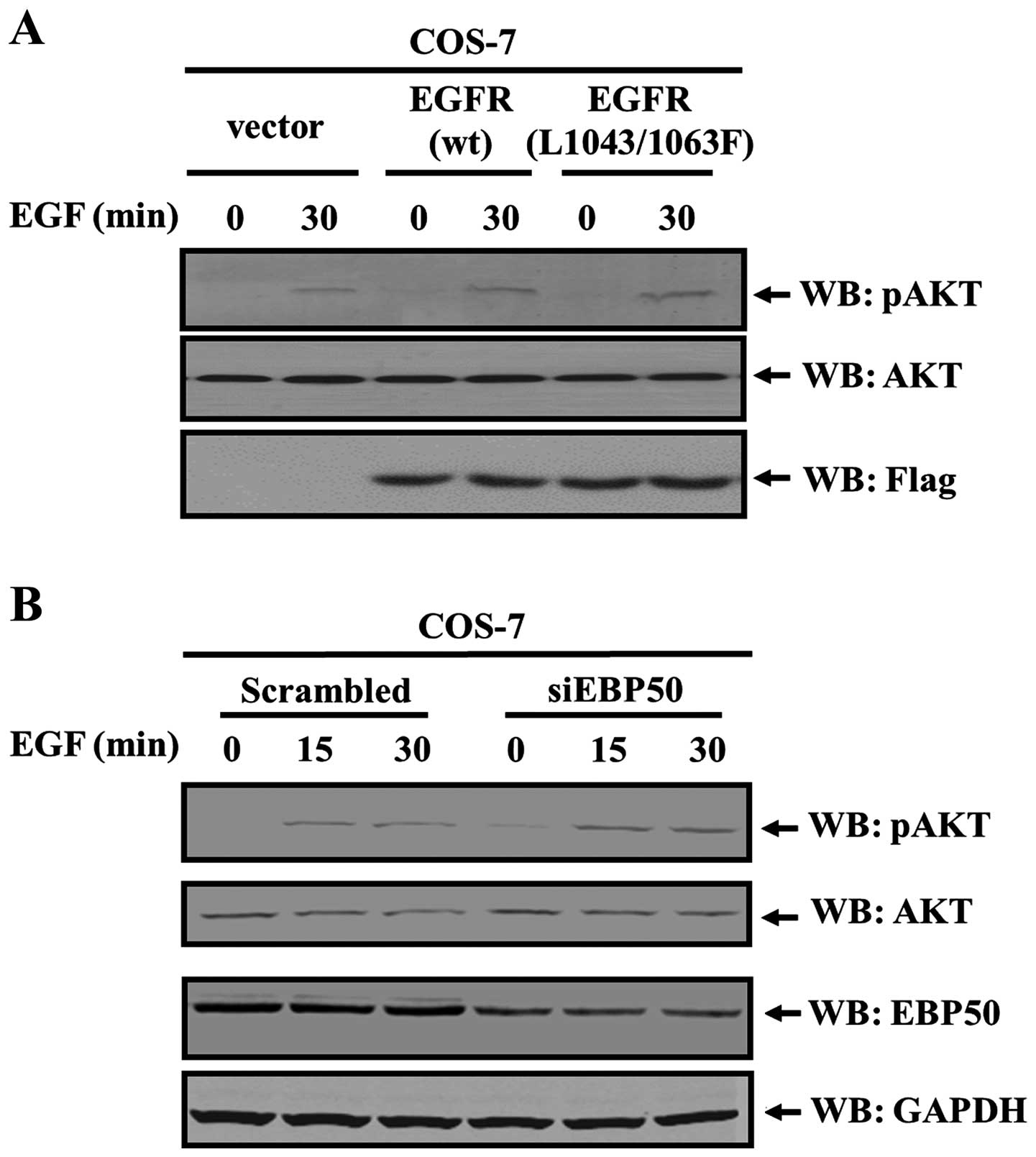|
1
|
Safdari Y, Khalili M, Ebrahimzadeh MA,
Yazdani Y and Farajnia S: Natural inhibitors of PI3K/AKT signaling
in breast cancer: Emphasis on newly-discovered molecular mechanisms
of action. Pharmacol Res. 93:1–10. 2015. View Article : Google Scholar
|
|
2
|
Jones S and Rappoport JZ: Interdependent
epidermal growth factor receptor signalling and trafficking. Int J
Biochem Cell Biol. 51:23–28. 2014. View Article : Google Scholar : PubMed/NCBI
|
|
3
|
Pan D and Lin X: Epithelial growth factor
receptor-activated nuclear factor κB signaling and its role in
epithelial growth factor receptor-associated tumors. Cancer J.
19:461–467. 2013. View Article : Google Scholar : PubMed/NCBI
|
|
4
|
Han W and Lo HW: Landscape of EGFR
signaling network in human cancers: Biology and therapeutic
response in relation to receptor subcellular locations. Cancer
Lett. 318:124–134. 2012. View Article : Google Scholar : PubMed/NCBI
|
|
5
|
Liu R, Gu J, Jiang P, Zheng Y, Liu X,
Jiang X, Huang E, Xiong S, Xu F, Liu G, et al: DNMT1-microRNA126
epigenetic circuit contributes to esophageal squamous cell
carcinoma growth via ADAM9-EGFR-AKT signaling. Clin Cancer Res.
21:854–863. 2015. View Article : Google Scholar
|
|
6
|
Khabele D, Kabir SM, Dong Y, Lee E, Rice
VM and Son DS: Preferential effect of akt2-dependent signaling on
the cellular viability of ovarian cancer cells in response to EGF.
J Cancer. 5:670–678. 2014. View
Article : Google Scholar : PubMed/NCBI
|
|
7
|
Liu G, Jiang C, Li D, Wang R and Wang W:
miRNA-34a inhibits EGFR-signaling-dependent MMP7 activation in
gastric cancer. Tumour Biol. 35:9801–9806. 2014. View Article : Google Scholar : PubMed/NCBI
|
|
8
|
Pei J, Lou Y, Zhong R and Han B: MMP9
activation triggered by epidermal growth factor induced Foxo1
nuclear exclusion in non-small cell lung cancer. Tumour Biol.
35:6673–6678. 2014. View Article : Google Scholar : PubMed/NCBI
|
|
9
|
Wang XJ, Feng CW and Li M: ADAM17 mediates
hypoxia-induced drug resistance in hepatocellular carcinoma cells
through activation of EGFR/PI3K/Akt pathway. Mol Cell Biochem.
380:57–66. 2013. View Article : Google Scholar : PubMed/NCBI
|
|
10
|
Liu W, Ren H, Ren J, Yin T, Hu B, Xie S,
Dai Y, Wu W, Xiao Z, Yang X, et al: The role of
EGFR/PI3K/Akt/cyclinD1 signaling pathway in acquired middle ear
cholesteatoma. Mediators Inflamm. 2013:6512072013. View Article : Google Scholar : PubMed/NCBI
|
|
11
|
Tiganis T, Kemp BE and Tonks NK: The
protein-tyrosine phosphatase TCPTP regulates epidermal growth
factor receptor-mediated and phosphatidylinositol
3-kinase-dependent signaling. J Biol Chem. 274:27768–27775. 1999.
View Article : Google Scholar : PubMed/NCBI
|
|
12
|
Scharl M, Rudenko I and McCole DF: Loss of
protein tyrosine phosphatase N2 potentiates epidermal growth factor
suppression of intestinal epithelial chloride secretion. Am J
Physiol Gastrointest Liver Physiol. 299:G935–G945. 2010. View Article : Google Scholar : PubMed/NCBI
|
|
13
|
Omerovic J, Clague MJ and Prior IA:
Phosphatome profiling reveals PTPN2, PTPRJ and PTEN as potent
negative regulators of PKB/Akt activation in Ras-mutated cancer
cells. Biochem J. 426:65–72. 2010. View Article : Google Scholar
|
|
14
|
Takahashi Y, Morales FC, Kreimann EL and
Georgescu MM: PTEN tumor suppressor associates with NHERF proteins
to attenuate PDGF receptor signaling. EMBO J. 25:910–920. 2006.
View Article : Google Scholar : PubMed/NCBI
|
|
15
|
Maudsley S, Zamah AM, Rahman N, Blitzer
JT, Luttrell LM, Lefkowitz RJ and Hall RA: Platelet-derived growth
factor receptor association with Na(+)/H(+) exchanger regulatory
factor potentiates receptor activity. Mol Cell Biol. 20:8352–8363.
2000. View Article : Google Scholar : PubMed/NCBI
|
|
16
|
Yang L, Wang Y, Chen P, Hu J, Xiong Y,
Feng D, Liu H, Zhang H, Yang H and He J: Na(+)/H(+) exchanger
regulatory factor 1 (NHERF1) is required for the
estradiol-dependent increase of phosphatase and tensin homolog
(PTEN) protein expression. Endocrinology. 152:4537–4549. 2011.
View Article : Google Scholar : PubMed/NCBI
|
|
17
|
Pan Y, Weinman EJ and Dai JL:
Na+/H+ exchanger regulatory factor 1 inhibits
platelet-derived growth factor signaling in breast cancer cells.
Breast Cancer Res. 10:R52008. View
Article : Google Scholar
|
|
18
|
Cheng S, Li Y, Yang Y, Feng D, Yang L, Ma
Q, Zheng S, Meng R, Wang S, Wang S, et al: Breast cancer-derived
K172N, D301V mutations abolish Na+/H+
exchanger regulatory factor 1 inhibition of platelet-derived growth
factor receptor signaling. FEBS Lett. 587:3289–3295. 2013.
View Article : Google Scholar : PubMed/NCBI
|
|
19
|
Rodriguez S and Huynh-Do U: Phosphatase
and tensin homolog regulates stability and activity of EphB1
receptor. FASEB J. 27:632–644. 2013. View Article : Google Scholar
|
|
20
|
Yao W, Feng D, Bian W, Yang L, Li Y, Yang
Z, Xiong Y, Zheng J, Zhai R and He J: EBP50 inhibits EGF-induced
breast cancer cell proliferation by blocking EGFR phosphorylation.
Amino Acids. 43:2027–2035. 2012. View Article : Google Scholar : PubMed/NCBI
|
|
21
|
Lazar CS, Cresson CM, Lauffenburger DA and
Gill GN: The Na+/H+ exchanger regulatory
factor stabilizes epidermal growth factor receptors at the cell
surface. Mol Biol Cell. 15:5470–5480. 2004. View Article : Google Scholar : PubMed/NCBI
|
|
22
|
Zheng J, Shen H, Xiong Y, Yang X and He J:
The beta1-adrenergic receptor mediates extracellular
signal-regulated kinase activation via Galphas. Amino Acids.
38:75–84. 2010. View Article : Google Scholar
|
|
23
|
Zheng JF, Sun LC, Liu H, Huang Y, Li Y and
He J: EBP50 exerts tumor suppressor activity by promoting cell
apoptosis and retarding extracellular signal-regulated kinase
activity. Amino Acids. 38:1261–1268. 2010. View Article : Google Scholar
|
|
24
|
Sun C, Zheng J, Cheng S, Feng D and He J:
EBP50 phosphorylation by Cdc2/cyclin B kinase affects actin
cytoskeleton reorganization and regulates functions of human breast
cancer cell line MDA-MB-231. Mol Cells. 36:47–54. 2013. View Article : Google Scholar : PubMed/NCBI
|
|
25
|
Yang X, Zheng J, Xiong Y, Shen H, Sun L,
Huang Y, Sun C, Li Y and He J: Beta-2 adrenergic receptor mediated
ERK activation is regulated by interaction with MAGI-3. FEBS Lett.
584:2207–2212. 2010. View Article : Google Scholar : PubMed/NCBI
|
|
26
|
He X, Arrotta N, Radhakrishnan D, Wang Y,
Romigh T and Eng C: Cowden syndrome-related mutations in PTEN
associate with enhanced proteasome activity. Cancer Res.
73:3029–3040. 2013. View Article : Google Scholar : PubMed/NCBI
|
|
27
|
Xu J, Li Z, Wang J, Chen H and Fang JY:
Combined PTEN mutation and protein expression associate with
overall and disease-free survival of glioblastoma patients. Transl
oncol. 7:196–205.e1. 2014. View Article : Google Scholar : PubMed/NCBI
|
|
28
|
Zhang SJ, Endo S, Ichikawa T, Yoshimura J,
Onda K, Tanaka R, Washiyama K and Kumanishi T: Rare-type mutations
of MMAC1 tumor suppressor gene in human glioma cell lines and their
tumors of origin. Jpn J Cancer Res. 90:934–941. 1999. View Article : Google Scholar : PubMed/NCBI
|
|
29
|
Valiente M, Andrés-Pons A, Gomar B, Torres
J, Gil A, Tapparel C, Antonarakis SE and Pulido R: Binding of PTEN
to specific PDZ domains contributes to PTEN protein stability and
phosphory-lation by microtubule-associated serine/threonine
kinases. J Biol Chem. 280:28936–28943. 2005. View Article : Google Scholar : PubMed/NCBI
|
|
30
|
Xu D, Yao Y, Jiang X, Lu L and Dai W:
Regulation of PTEN stability and activity by Plk3. J Biol Chem.
285:39935–39942. 2010. View Article : Google Scholar : PubMed/NCBI
|
|
31
|
Maxwell GL, Risinger JI, Gumbs C, Shaw H,
Bentley RC, Barrett JC, Berchuck A and Futreal PA: Mutation of the
PTEN tumor suppressor gene in endometrial hyperplasias. Cancer Res.
58:2500–2503. 1998.PubMed/NCBI
|
|
32
|
Barton S, Starling N and Swanton C:
Predictive molecular markers of response to epidermal growth factor
receptor (EGFR) family-targeted therapies. Curr Cancer Drug
Targets. 10:799–812. 2010. View Article : Google Scholar : PubMed/NCBI
|
|
33
|
Suzuki T, Fujii A, Ohya J, Amano Y, Kitano
Y, Abe D and Nakamura H: Pharmacological characterization of MP-412
(AV-412), a dual epidermal growth factor receptor and ErbB2
tyrosine kinase inhibitor. Cancer Sci. 98:1977–1984. 2007.
View Article : Google Scholar : PubMed/NCBI
|
|
34
|
Yang S, Qu S, Perez-Tores M, Sawai A,
Rosen N, Solit DB and Arteaga CL: Association with HSP90 inhibits
Cbl-mediated down-regulation of mutant epidermal growth factor
receptors. Cancer Res. 66:6990–6997. 2006. View Article : Google Scholar : PubMed/NCBI
|
|
35
|
Choura M, Frikha F, Kharrat N, Aifa S and
Rebaï A: Investigating the function of three non-synonymous SNPs in
EGFR gene: Structural modelling and association with breast cancer.
Protein J. 29:50–54. 2010. View Article : Google Scholar : PubMed/NCBI
|
|
36
|
Ueno S, Sudo T, Oka N, Wakahashi S,
Yamaguchi S, Fujiwara K, Mikami Y and Nishimura R: Absence of human
papillomavirus infection and activation of PI3K-AKT pathway in
cervical clear cell carcinoma. Int J Gynecol Cancer. 23:1084–1091.
2013. View Article : Google Scholar : PubMed/NCBI
|
|
37
|
Georgescu MM, Morales FC, Molina JR and
Hayashi Y: Roles of NHERF1/EBP50 in cancer. Curr Mol Med.
8:459–468. 2008. View Article : Google Scholar : PubMed/NCBI
|
|
38
|
Shibata T, Chuma M, Kokubu A, Sakamoto M
and Hirohashi S: EBP50, a beta-catenin-associating protein,
enhances Wnt signaling and is over-expressed in hepatocellular
carcinoma. Hepatology. 38:178–186. 2003. View Article : Google Scholar : PubMed/NCBI
|


















